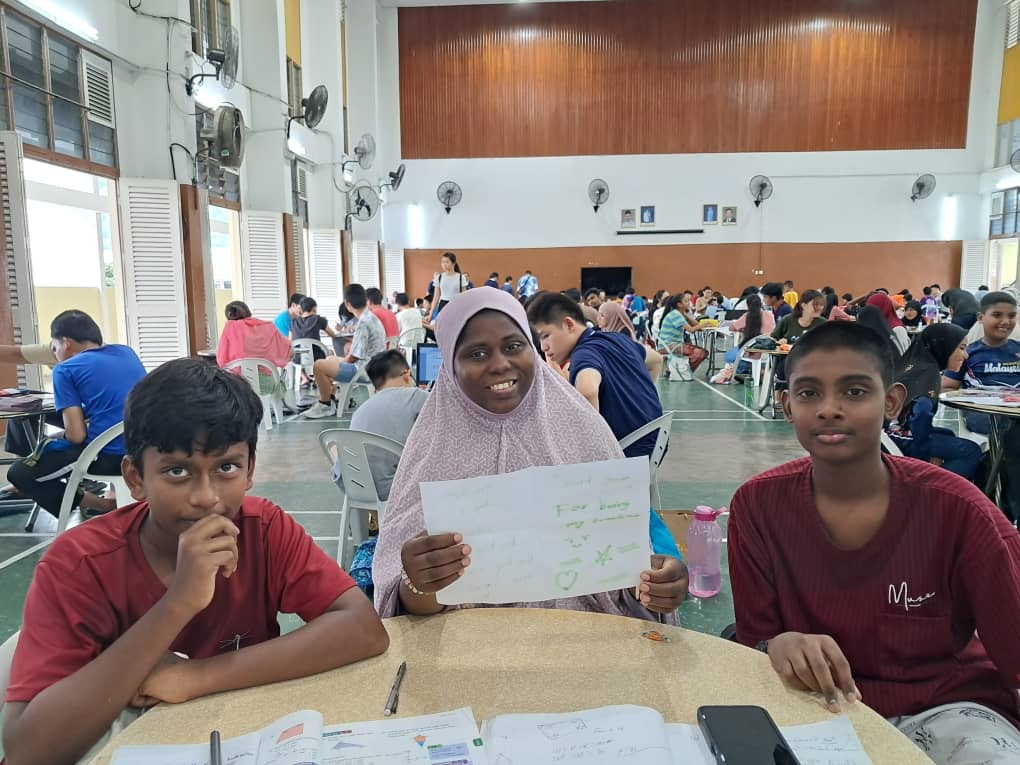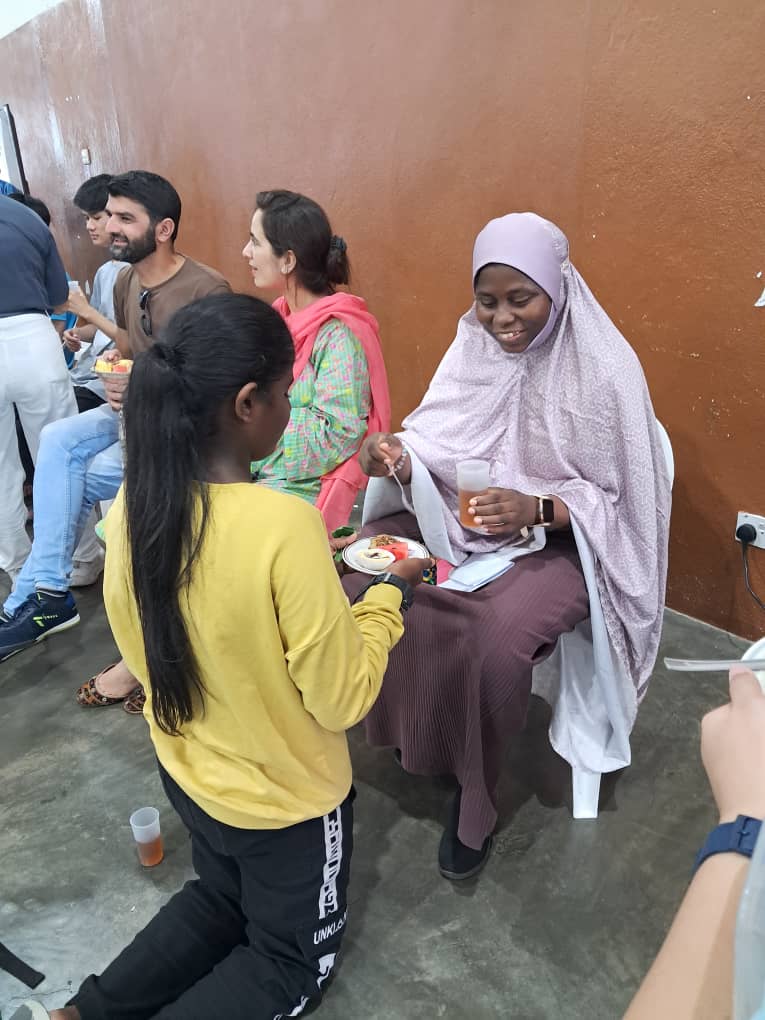PADANG TEMBAK COMMUNITY CENTRE , May 18 2025 -
BREAKING THE CYCLE OF POVERTY THROUGH EDUCATION AND COMMUNITY SERVICE: THE AMDI - TZU CHI NGO INITIATIVE
Poverty remains one of the most pressing global challenges, including in Malaysia, affecting millions of individuals by limiting access to basic needs such as food, shelter, healthcare, and adequate educational opportunities. One of the root causes of poverty is the lack of equitable access to education and essential resources, which hinders individuals from securing stable employment and improving their quality of life.
By investing in accessible and quality education—especially for children from low-income families—societies can break the cycle of poverty across generations. In 2019, Dr. Ying Chee Keat from the Advanced Medical and Dental Institute (AMDI), Universiti Sains Malaysia (USM), initiated a personalised teaching community service program in collaboration with the Tzu Chi NGO. The program began at the Padang Tembak Community Centre in Penang.
The program emphasizes one-to-one or small-group tutoring, with USM students participating as mentors to provide personalised guidance to students from underprivileged families. This approach aligns with the findings recognised by the 2019 Nobel Prize in Economic Sciences, which highlighted that assigning personal tutors and providing tailored support can significantly improve students’ learning outcomes.
Since 2019, more than 100 USM students—including those from AMDI—have participated in the program. To strengthen the collaboration and encourage wider student involvement, AMDI has initiated a Memorandum of Agreement (MoA) with the Tzu Chi NGO, represented by AMDI’s former Director, Professor Dr. Tunku Kamarul Zaman Tunku Zainol Abidin. By participating in the program, not only do students from low-income families benefit, but the mentors—university students—also gain valuable experience in community service and personal growth. Many have shared that the program has had a meaningful impact on their lives. Here is one touching story: an international student from Africa, Ajetunmobi, shares her experience after joining the program.
LIGHTING THE PATH FORWARD
When Arulsan, Halen Raj, and Nasai surprised me with handmade cards and heartfelt messages on Teachers' Day, I was reminded why I began this journey two years ago. As their faces beamed with pride, I reflected on the remarkable power of mentorship to transform their lives and mine.

Photo By Tzu Chi Volunteer
Teachers' Day Gift from students
"Teachers are like candles that share light for others to see," goes the saying that has guided my approach to education since I first volunteered as a tutor back in 2000, when I was merely a junior secondary school student in Nigeria."
Today, as an international PhD student in Food Technology at Universiti Sains Malaysia (USM), I've found a way to continue this passion through the Padang Tembak Community Centre, where I've joined the USM Community Enrichment Program as a USM Education Ambassador to provide personalised tuition to undergraduate students.
Photo By Tzu Chi Volunteer
The student offers tea to the mentor as a gesture of appreciation
BEYOND TEXTBOOKS: THE MENTOR-STUDENT RELATIONSHIP
"The moment when a concept finally clicks for a struggling student is pure magic," Cikgu Rukayat, as my students affectionately called me. I believe that teaching is not just about teaching facts but about nurturing confidence."
The Padang Tembak Community Centre serves students from various backgrounds, many of whom face significant educational challenges. Volunteers help bridge learning gaps that might otherwise go unaddressed in traditional classroom settings through personalised attention and innovative teaching methods.
"Before coming to the centre, I was afraid to ask questions in school," confesses Arulsan, one of my regular students. "Now I'm raising my hand in class and helping my friends understand difficult topics."
This transformation exemplifies what educators call the "mentorship effect" when guidance extends beyond academic support to build self-belief and resilience. Research shows that students with mentors are 55% more likely to enrol in college and 130% more likely to hold leadership positions.
CREATING RIPPLES OF CHANGE
The impact of educational volunteering extends far beyond individual success stories.
Mentorship is not just a concept but a powerful force that propels individuals toward success. Through practical guidance and support, mentors transform lives, unlocking potential and igniting ambition. With their experience and insights, mentors empower mentees to navigate challenges, seize opportunities, and achieve their goals. The impact of mentorship resonates deeply, fostering personal growth and professional development. Embracing mentorship can lead to profound changes, making it an essential cornerstone for anyone seeking to elevate their journey.
Community-based programs like the Padang Tembak Community Centre contribute to several Sustainable Development Goals, particularly SDG 1 (No poverty), SDG 4 (Quality Education), DG 8 (Decent Work and Economic Growth), SDG 10 (Reduced Inequalities), and SDG 17 (Partnership for the Goals).
"What makes these initiatives powerful is their ripple effect," explains Dr. C.K Ying from AMDI, a USM community enrichment program coordinator. "When we empower one student, we potentially lift an entire family toward better opportunities."
This broader impact motivates me to continue my commitment despite the demands of doctoral research. "My students' academic improvements in their respective schools validate the hours we invest together. When Halen Raj proudly showed me his improved mathematics scores, I knew our Sunday afternoon sessions were making a difference."
THE GLOBAL CITIZEN AS LOCAL MENTOR
As an International student, I bring unique perspectives to educational volunteering. "Coming from Nigeria, I understand the universal challenges that students face across cultural contexts. "Mathematics might look different in different languages, but the struggle to master it feels the same everywhere."
This cross-cultural dimension enhances the learning experience, exposing students to diverse worldviews while reinforcing universal values of perseverance and curiosity. For TZU CHI and USM, partnering with local and international student volunteers creates a rich educational environment that prepares young learners for an increasingly interconnected world.
FULL CIRCLE: FROM STUDENT TO MENTOR
My journey from a young volunteer in 2000 to an international PhD student and dedicated mentor illustrates the cyclical nature of educational empowerment.
"I still remember my first tutoring experience when I was just 13,". "That early taste of making a difference shaped my educational path and continues to influence my approach to both teaching and research."
This full-circle perspective informs my mentorship style: she balances academic rigour with empathy and knows firsthand how a supportive guide can change a student's trajectory.
"When I see potential in my students that they haven't yet recognised in themselves, I'm reminded of teachers who once did the same for me,"
SUSTAINABILITY THROUGH SKILLS AND CONFIDENCE
Educational volunteering creates a sustainable impact by developing practical skills and emotional intelligence. At the Padang Tembak Community Centre, tutors incorporate interactive learning methods that engage education while building critical thinking abilities.
We don't just help with homework, but We teach students to approach problems independently, organise their thoughts, and persist when concepts seem difficult
These transferable skills extend beyond academic subjects, preparing students for lifelong learning and adaptability in a rapidly changing world.
"What I've learned from Teacher Rukayat is that mistakes are part of learning," says Arulsan. "Now I try new things without worrying about being perfect the first time."
THE FUTURE OF MENTORSHIP
As educational systems worldwide adapt to changing technologies and social needs, community-based mentorship programs provide a stable foundation for personalised learning support.
The relationship between mentor and student remains irreplaceable, even as digital tools transform education. Though the technology can deliver information, mentors inspire the motivation to learn."
This philosophy drives continued investment in volunteer programs that complement formal education with personalised guidance for USM and Padang Tembak Community.
"Our partnership with dedicated volunteers like Rukayat exemplifies how universities can create meaningful community impact," notes Dr C.K Ying from AMDI, the USM Community Enrichment Program's Coordinator. These programs represent education at its most transformative.
A MESSAGE OF GRATITUDE
I express profound gratitude for the opportunity to give back to the community.
"I am immensely thankful to USM and Padang Tembak Community Centre for creating this platform where knowledge sharing becomes a two-way street. To my outstanding students, especially Arulsan, Halen Raj, and Nasai, your progress makes every challenge worthwhile. I believe your success is my most impressive achievement. May you continue to thrive and one day pass on the light of knowledge to others."
Take home for aspiring mentors? "Begin where you are, with what you know. The light you share with others will illuminate your path forward."
*The USM Education Ambassador (EA) Community Enrichment Program is an initiative launched in 2019 by the Advanced Medical & Dental Institute (AMDI), Universiti Sains Malaysia, in collaboration with the Buddhist Tzu-Chi Merits Society Malaysia. It aims to provide quality education and personalised or small-group tuition for underprivileged students from our local community. EA's role is to build their interest and boost their confidence in learning.
This program also bridges university students to local communities by cultivating the spirit of community service and volunteerism through real-life practices.
This initiative bridges the educational gap and reflects USM's mission of "Transforming Higher Education for a Sustainable Tomorrow", nurturing a more equitable and inclusive society.
Author: Ajetunmobi-Adeyeye Rukayat Ibiwumi, Food Technology division, school of Industrial Technology, USM co-author: Dr Ying Chee Keat, AMDI, USM
SDG 1 - End poverty in all its forms everywhere
SDG 4 - Ensure inclusive and equitable quality education and promote lifelong learning opportunities for all
SDG 8 - Promote sustained, inclusive and sustainable economic growth, full and productive employment and decent work for all
SDG 10 - Reduce inequality within and among countries
SDG 17 - Strengthen the means of implementation and revitalize the Global Partnership for Sustainable Development




